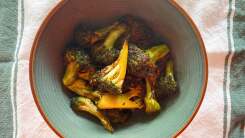The Easiest Way to Make Any Sheet Pan Recipe so Much Better
In theory, sheet pan meals are a flawless solution to the eternal question of what to make for dinner. They’re just as hands-off and convenient as slow cooker or Instant Pot recipes, but with less waiting around (and even fewer dishes to wash). But often, a recipe that looked gorgeous and appetizing in photos can easily turn into a damp, bland, depressing mess. Here’s how to make any sheet pan recipe actually work.
When sheet pan recipes fail, it’s often for an obvious reason: Cramming protein and vegetables side-by-side means that neither gets a chance to cook properly. Proteins, particularly meat, take longer to cook than most vegetables; by the time the meat’s done, the veg is mush. (And if you don’t cook the meat all the way through, the veg just stews in undercooked meat juice. Not great!) Another issue: Both components tend to let off a ton of moisture as they cook. Without enough room to breathe, all that excess water hangs out in the pan, ensuring everything gets soft and soggy—not crisp and brown.
The solution is as simple and obvious as the problem itself. Just use two sheet pans: One for the protein, and one for everything else. I usually use two half-size sheet pans, but it’s not like you need to go out and buy a special matching set; as long as you have two pans, you have everything you need to improve literally any sheet pan meal. Splitting up the components lets you monitor each pan as it cooks and pull it out when it’s perfectly cooked. You can serve the components separately or mix them together and pop everything back in the oven for a few minutes before serving—whichever floats your boat.

In addition to making simple, easy recipes more reliable, this method also lends itself to meal prep exceptionally well. When you’re working with two (or more) pans, you can easily double or triple the recipe without worrying about overflow—or, worse, winding up with a huge batch of something subpar. Recently, I’ve gotten really into roasting cubed firm tofu with olive oil, salt, brown sugar, and garlic powder in one pan, and whatever veggies I have on the other. When everything’s done cooking, I finish it off by combining the contents of both pans in one pan, adding a bit of flavorful liquid—like teriyaki sauce, vinaigrette, veggie stock, or bean juice—and popping it back into the oven for another 5 or 10 minutes. My little concoctions come out of the oven caramelized, flavorful, and perfectly cooked. Sure, a second pan means one more dish to wash—but once you get the hang of this method, you’ll be too busy eating to care.
RECOMMENDED NEWS

Popeyes' Pre-Cooked Turkey Absolutely Fucks (and You Can Make It Even Better)
2025-10-16

A cooked turkey on a platter surrounded by a gravy boat and utensils
2025-10-14

Get Thee to an Air Fryer and Make Maple Candied Broccoli
2025-10-14

The Difference Between Cornmeal, Grits, and Polenta
2025-10-15

Give Your Veggies a Hot-Wing Vibe With This Buffalo Vinaigrette
2025-10-17

Kick Off St. Patrick's Day With a Guinness Dutch Baby
2025-10-14
Comments on "The Easiest Way to Make Any Sheet Pan Recipe so Much Better" :